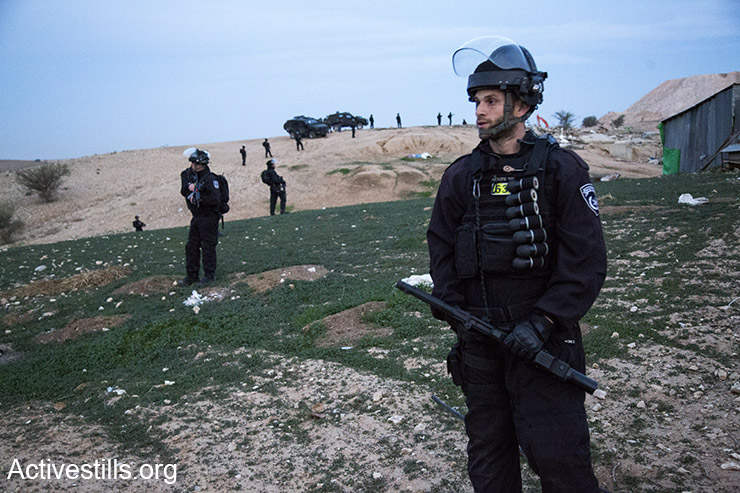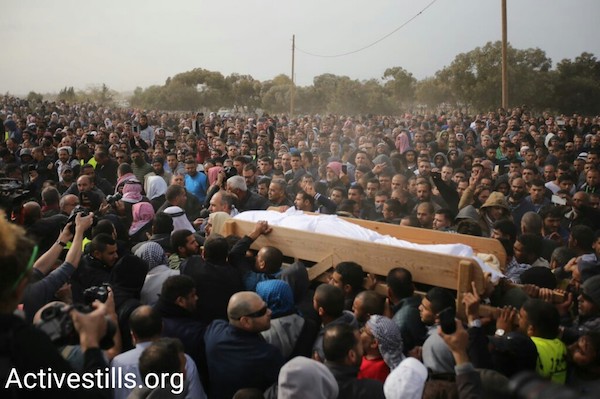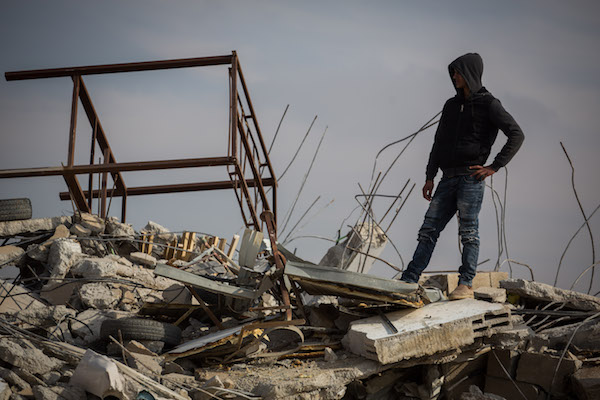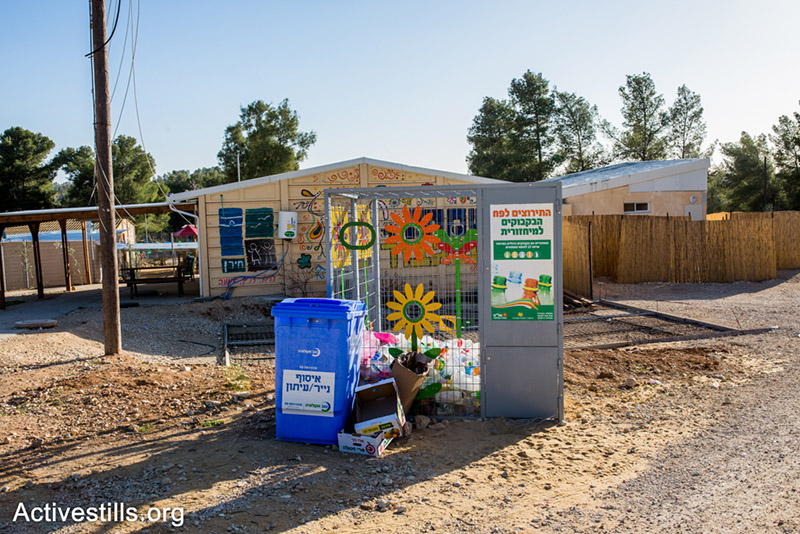It has been half a year since Israeli police killed Yacoub Abu al-Qi’an during the demolition of his home. Now the police are back to demolish structures donated to provide shelter to his children.

It has been nearly a year and a half since a police raid on the Bedouin village of Umm al-Hiran ended in the death of Yacoub Abu Al-Qi’an and police officer Erez Levi, yet Israeli Police have yet to publish the findings of its investigation into the incident. Meanwhile, the path is clear for the authorities to continue demolishing the village’s homes.
This time they are after makeshift structures donated to Yacoub Abu al-Qi’an’s family after he was killed by police in the early hours of January 18. Police initially claimed Abu al-Qi’an, a local math teacher, had deliberately plowed into a crowd of police officers during home demolitions in the village. Yet according to numerous eyewitnesses and independent investigations, officers opened fire on him while he was driving near ongoing clashes between villagers and police, causing him to accelerate, lose control of the vehicle, and fatally run over Levi.
Not a single government official thought to find a different solution for a family that was left that without a roof over its head, or for the children who were left without a father.

Over the past few days, with the end of the Muslim Eid al-Fitr holiday, which marks the final days of Ramadan, the possibility of demolitions has arisen once again. Residents are reporting that they received phone calls from both the police and the Bedouin Development Authority — which is mostly responsible for demolishing homes and removing the Bedouin population from the area — demanding the residents remove two tents and two mobile homes that were donated by private donors to Yacoub’s family. If they do not remove the structures themselves, Israeli authorities will demolish them.
The residents were first served with demolition orders for the structures as Ramadan was getting underway last month. On Sunday police officers arrived at the unrecognized village to prepare the area for what looks like an additional evacuation. The residents are preparing for the worst — since everyone remembers how the last evacuation ended.
Umm al-Hiran is one of dozen unrecognized Bedouin villages in the Negev Desert. For over a decade and a half, the residents have been waging a struggle against the state’s attempts to remove them and replace the village with the Jewish town “Hiran.” The future residents of Hiran have been living in caravans just kilometers from the village for the past few years, waiting for the day they can move in.
“We are living with uncertainty, with all the pain and grief,” Raed Abu Al-Qi’an, one of the leaders of the struggle in the village, tells Local Call. “Instead of letting us rest after Yacoub’s death, the state is continuing with its violent plan against us. Every issue can be sorted through by talking. But power breeds power, and power breeds enmity and hate. We don’t want to reach that place. We want to live in peace, on the basis of the values of partnership.”
“There is a solution and an alternative,” he continues. “The plots in Hiran are ready. So why aren’t we allowed to live there? Why are Jews allowed to decide where they will live, while the state forces us into only one option?”

“I call on every person, Jew, Christian, Muslim, to come and say something in order to help us fix what has been done to our population for 68 years. This cannot be done by the Bedouin alone, but rather by every group in Israel together. If we allow the settlers and their organizations to manage the state, we will be in deep trouble.”
A Jewish town in place of the Bedouin
The al-Qi’an tribe had been living in a region known as Khirbet Zubale for many years before the establishment of the state. In 1948, the Israeli military government — which ruled over Israel’s Arab population until 1966 — forcefully transferred the tribe from their land and settled them near Yatir Forest, where they established Umm al-Hiran. Their land was then transferred over to Kibbutz Shoval. This forced land transfer is well-documented in the state archives, and yet the villagers, who were forced to moved to their new location by the state, have never been hooked up to electricity or water infrastructure.

In January 2016, the High Court ruled that the state can change its mind and take back the land on which it settled the tribe. The court approved the state’s decision to expel the residents of Umm al-Hiran and establish Hiran in its place. This paves the way for the destruction of entire villages and the removal of 1,200 Bedouin from their land, who will be pushed into the nearby Bedouin township of Hura.
The police confirmed that the aforementioned mobile structures are slated for demolition, and that if necessary, the police will be assisted by the Bedouin Development Authority. The police also confirmed that phone calls were made to residents in order to let them know that if they do not demolish the structures themselves, the authorities will have to take action.
Meanwhile the Police Investigation Unit has yet to publish the results of the investigation into the death of al-Qi’an and Levi. This despite the fact that by now it is fairly clear that the police’s, and Public Security Minister Gilad Erdan’s, original version — according to which al-Qi’an was a terrorist who deliberately plowed into police officers who were standing by during demolitions in the village — was a lie based on nothing but racist allegations. Perhaps this is the central reason for the foot dragging.
The police have yet to issue a response over when exactly the findings will be published. This post will be updated if and when that response is issued.
Yael Marom is Just Vision’s public engagement manager in Israel and a co-editor of Local Call, where this article was originally published in Hebrew.
